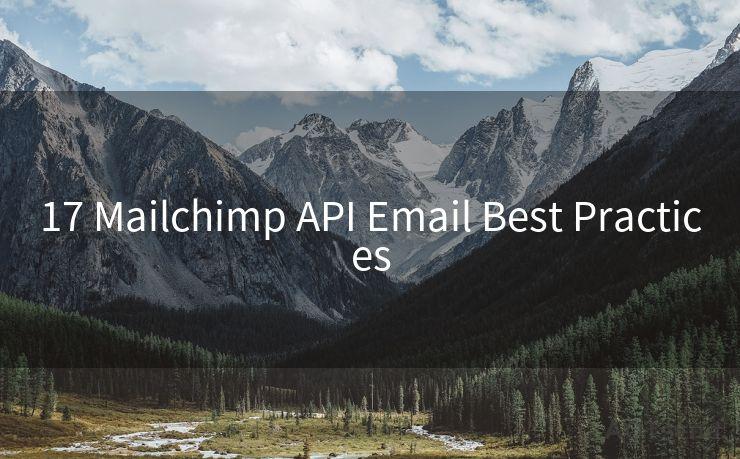17 Mailchimp API Email Best Practices




Email marketing remains a powerful tool for reaching customers and prospects. When used effectively, it can drive conversions, build brand loyalty, and enhance customer engagement. Mailchimp, a popular email marketing platform, offers an API that allows marketers to integrate email campaigns into their overall marketing strategy seamlessly. In this article, we'll explore 17 best practices for using the Mailchimp API in your email marketing efforts.
1. Understand Your Audience
Before diving into the Mailchimp API, it's crucial to understand your target audience. This understanding will help you craft relevant and engaging email content that resonates with your subscribers.
2. Segment Your Lists
Utilize Mailchimp's segmentation features to target specific groups within your audience. The API allows you to manage these segments programmatically, ensuring that your messages are highly targeted and relevant.
3. Personalize Your Messages
Use the Mailchimp API to personalize email content. By inserting merge tags, you can dynamically insert subscriber details like names or purchase history, making your emails more personal and engaging.
4. Optimize Your Subject Lines
Craft compelling subject lines that grab attention and encourage opens. The API allows you to test and optimize these subject lines for maximum impact.
5. Design for Mobile
Ensure your emails are mobile-friendly. With the majority of emails being opened on mobile devices, it's essential to use responsive templates that adapt to different screen sizes.
6. Test Your Emails
Utilize Mailchimp's inbox preview tool and A/B testing features to see how your emails will appear in various email clients and to test different versions of your emails for effectiveness.
7. Automate Your Campaigns
The Mailchimp API enables you to automate your email campaigns, saving time and ensuring timely delivery. Set up autoresponders or drip campaigns to nurture leads and engage subscribers.
8. Monitor and Adjust
Regularly monitor your email campaigns' performance using Mailchimp's analytics tools. The API provides access to detailed reports, allowing you to adjust your strategy based on real-time data.
9. Handle Unsubscribes Gracefully
Respect your subscribers' wishes if they choose to unsubscribe. Use the API to manage unsubscribe requests and ensure a smooth process.
10. StayCompliant with Email Regulations
Familiarize yourself with email marketing regulations like CAN-SPAM and CASL. The Mailchimp API helps you manage opt-ins and opt-outs, ensuring compliance with these laws.
11. Integrate with Other Systems
Leverage the Mailchimp API to integrate your email marketing efforts with other business systems, such as CRMs or e-commerce platforms, for a more holistic marketing approach.
12. Use Transactional Emails Wisely
🔔🔔🔔
【AOTsend Email API】:AOTsend is a Managed Email Service for sending transactional emails. Support Email Types: reminders, authentication, confirmations, notifications, verification codes, invoices, password resets, account activations, billing statements, two-factor authentication (2FA), and one-time passwords (OTP) emails, etc. $0.28 per 1000 Emails. 99% Delivery, 98% Inbox Rate.
You might be interested in:
Why did we start the AOTsend project, Brand Story?
What is a Managed Email API, How it Works?
Best 25+ Email Marketing Platforms (Authority,Keywords&Traffic Comparison)
Best 24+ Email Marketing Service (Price, Pros&Cons Comparison)
Email APIs vs SMTP: How they Works, Any Difference?
Transactional emails, like order confirmations or password resets, have high open rates. Use the API to customize these emails and include relevant marketing messages.
13. Experiment with Dynamic Content

Explore using dynamic content blocks in your emails. The Mailchimp API supports this feature, allowing you to show different content to different subscribers based on their preferences or behaviors.
14. Maintain a Consistent Brand Voice
Ensure your emails reflect your brand's voice and style. The API gives you the flexibility to maintain brand consistency across all your email communications.
15. Encourage Social Sharing
Include social sharing buttons in your emails to encourage subscribers to share your content on their social media channels.
16. Follow Up with Non-Openers
Use the API to identify subscribers who haven't opened your emails and send them targeted follow-ups to re-engage them.
17. Continuously Learn and Iterate
Email marketing is an ongoing process of learning and optimization. Stay up to date with Mailchimp's latest features and best practices, and use the API to continuously improve your campaigns.
By following these best practices and leveraging the power of the Mailchimp API, you can take your email marketing campaigns to the next level, driving better engagement, conversions, and ultimately, business growth.




Scan the QR code to access on your mobile device.
Copyright notice: This article is published by AotSend. Reproduction requires attribution.
Article Link:https://www.mailwot.com/p2712.html



